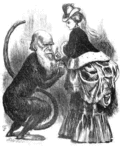Sexual selection
Sexual selection is a mode of natural selection where members of one biological sex choose mates of the other sex to mate with (intersexual selection), and compete with members of the same sex for access to members of the opposite sex (intrasexual selection). These modes of sexual selection result in the development of secondary sexual characteristics that distinguish the two sexes of a species but are not directly involved in reproduction.
Overview[edit]
The concept of sexual selection was first articulated by Charles Darwin in his works On the Origin of Species (1859) and more extensively in The Descent of Man, and Selection in Relation to Sex (1871). Darwin proposed that sexual selection could lead to speciation by causing traits to evolve that make an individual more attractive to potential mates, thus influencing reproductive success. Sexual selection operates through two main mechanisms: intersexual selection, often referred to as mate choice, and intrasexual selection, or male-male competition.
Intersexual Selection[edit]
Intersexual selection, or mate choice, occurs when individuals of one sex (usually females) are choosy in selecting their mates from individuals of the opposite sex. This choosiness often depends on certain traits that are perceived as attractive or indicative of good genetics or high parental investment. Such traits might include physical appearance, courtship displays, or the ability to provide resources.
Intrasexual Selection[edit]
Intrasexual selection involves competition among members of the same sex (usually males) for access to mates. This can lead to the evolution of traits such as increased size, strength, or aggression, which can be used to outcompete rivals or to fend off predators and protect offspring.
Secondary Sexual Characteristics[edit]
Secondary sexual characteristics are traits that distinguish the two sexes of a species but are not directly involved in reproduction. These traits, which can include things like the colorful plumage of many birds, the antlers of deer, or the manes of lions, often evolve due to sexual selection pressures and serve to increase an individual's chances of reproductive success.
Examples[edit]
Examples of sexual selection in the animal kingdom are widespread and varied. Among birds, the elaborate dances and plumage of peafowl and birds of paradise are classic examples of traits that have likely evolved through mate choice. In mammals, the large size and strength of many male ungulates and primates have been attributed to intrasexual selection.
Human Sexual Selection[edit]
In humans, sexual selection is believed to have influenced a variety of physical and behavioral traits. These include differences in body size and shape, facial features, and the development of culture and language as means of attracting mates and competing with rivals.
Criticism and Controversy[edit]
The concept of sexual selection has been subject to criticism and controversy. Some scientists argue that the importance of sexual selection in driving evolution has been overstated, or that certain traits previously attributed to sexual selection may instead be the result of natural selection for survival rather than reproduction. Additionally, the role of female choice and the extent to which it influences male traits is a topic of ongoing research and debate.
Conclusion[edit]
Sexual selection is a fundamental mechanism of evolutionary change, influencing the development of traits that affect reproductive success. While the concept has evolved since Darwin's time, it remains a central theory in understanding the diversity of life on Earth.

Sexual_selection[edit]
-
Paradesia decora Keulemans
-
Darwin sexual caricature
-
Tribolium castaneum
-
Euplectes progne male South Africa
-
Peacock Flying
-
Irish Elk front
-
Susa group, mountain gorilla
-
Protarchaeopteryx
-
Gorilla family
-
Phidippus putnami male
-
Toe-Biter
-
Fireflies, Georgia, US
Ad. Transform your life with W8MD's Budget GLP-1 injections from $49.99


W8MD offers a medical weight loss program to lose weight in Philadelphia. Our physician-supervised medical weight loss provides:
- Weight loss injections in NYC (generic and brand names):
- Zepbound / Mounjaro, Wegovy / Ozempic, Saxenda
- Most insurances accepted or discounted self-pay rates. We will obtain insurance prior authorizations if needed.
- Generic GLP1 weight loss injections from $49.99 for the starting dose of Semaglutide and $65.00 for Tirzepatide.
- Also offer prescription weight loss medications including Phentermine, Qsymia, Diethylpropion, Contrave etc.
NYC weight loss doctor appointmentsNYC weight loss doctor appointments
Start your NYC weight loss journey today at our NYC medical weight loss and Philadelphia medical weight loss clinics.
- Call 718-946-5500 to lose weight in NYC or for medical weight loss in Philadelphia 215-676-2334.
- Tags:NYC medical weight loss, Philadelphia lose weight Zepbound NYC, Budget GLP1 weight loss injections, Wegovy Philadelphia, Wegovy NYC, Philadelphia medical weight loss, Brookly weight loss and Wegovy NYC
|
WikiMD's Wellness Encyclopedia |
| Let Food Be Thy Medicine Medicine Thy Food - Hippocrates |
Medical Disclaimer: WikiMD is not a substitute for professional medical advice. The information on WikiMD is provided as an information resource only, may be incorrect, outdated or misleading, and is not to be used or relied on for any diagnostic or treatment purposes. Please consult your health care provider before making any healthcare decisions or for guidance about a specific medical condition. WikiMD expressly disclaims responsibility, and shall have no liability, for any damages, loss, injury, or liability whatsoever suffered as a result of your reliance on the information contained in this site. By visiting this site you agree to the foregoing terms and conditions, which may from time to time be changed or supplemented by WikiMD. If you do not agree to the foregoing terms and conditions, you should not enter or use this site. See full disclaimer.
Credits:Most images are courtesy of Wikimedia commons, and templates, categories Wikipedia, licensed under CC BY SA or similar.
Translate this page: - East Asian
中文,
日本,
한국어,
South Asian
हिन्दी,
தமிழ்,
తెలుగు,
Urdu,
ಕನ್ನಡ,
Southeast Asian
Indonesian,
Vietnamese,
Thai,
မြန်မာဘာသာ,
বাংলা
European
español,
Deutsch,
français,
Greek,
português do Brasil,
polski,
română,
русский,
Nederlands,
norsk,
svenska,
suomi,
Italian
Middle Eastern & African
عربى,
Turkish,
Persian,
Hebrew,
Afrikaans,
isiZulu,
Kiswahili,
Other
Bulgarian,
Hungarian,
Czech,
Swedish,
മലയാളം,
मराठी,
ਪੰਜਾਬੀ,
ગુજરાતી,
Portuguese,
Ukrainian











